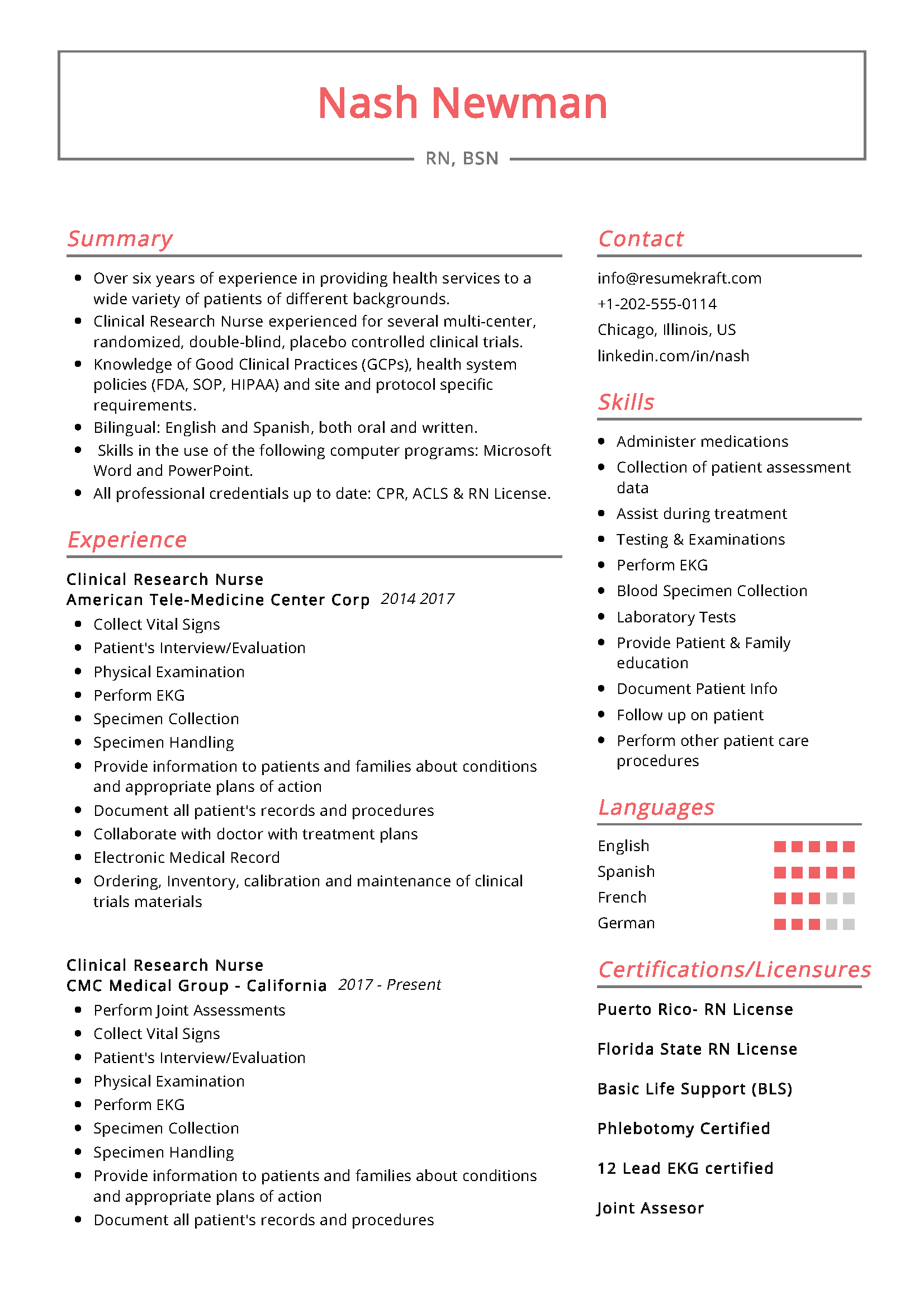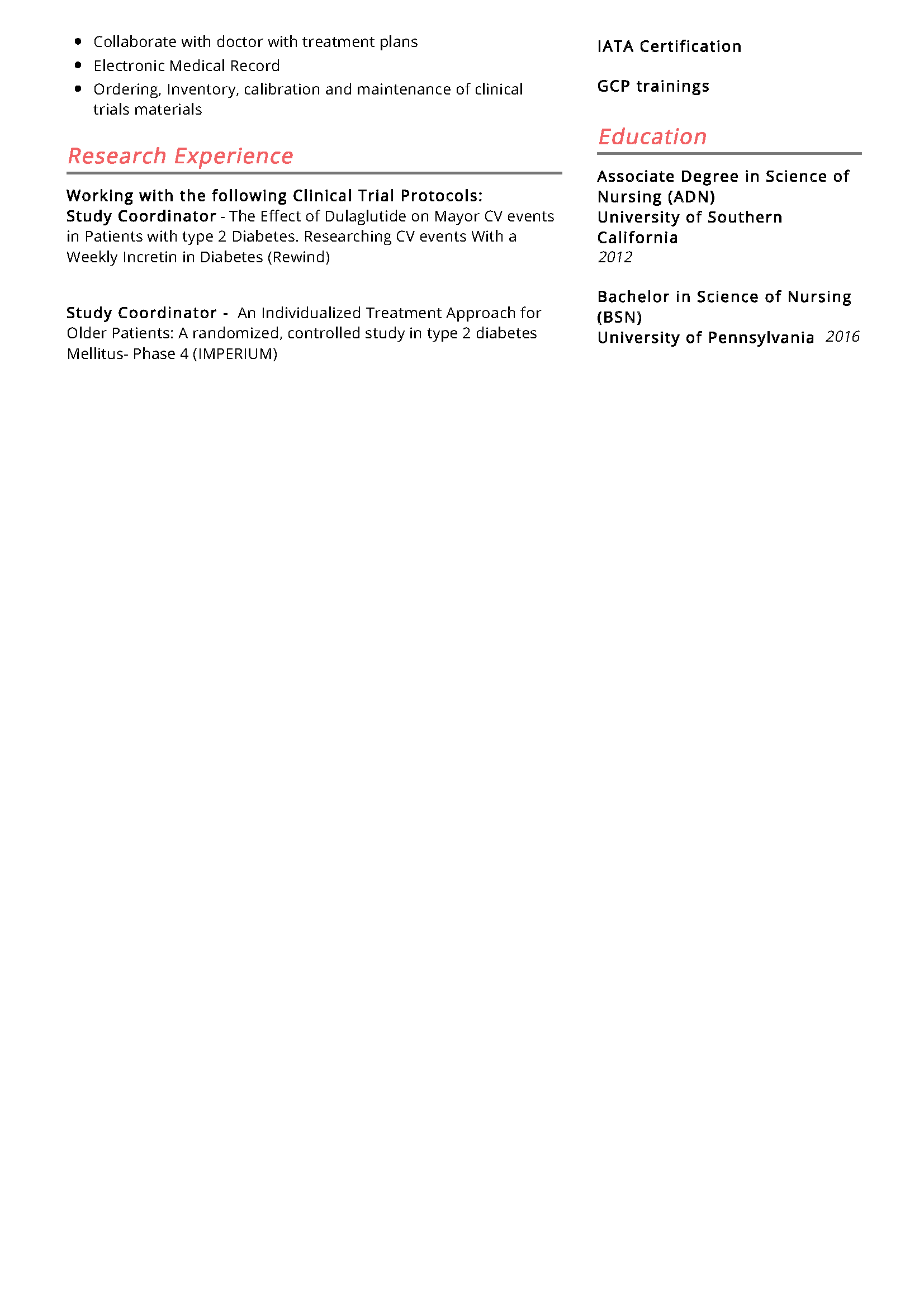RN BSN Resume with Writing Guide
A resume is an objective overview of your skills, education, and experience. This document provides a snapshot of who you are and what you can offer as an employee. A resume should be tailored to each individual job opening; you do not want to send the same resume for all job postings.
The resume article will provide you with basic information on writing your resume, and help with guiding you in the creation of a resume that displays your skills and values to employers.
RN BSN Resume Writing Guide:
1. Know your Profession:
Think of your profession as a combination of skills and education. Knowing the minimum requirements to be successful in that profession is important. For example, if you are a nurse, are you an RN? What type of nursing experience do you have? What type of education do you have? Have you had training or certifications related to your desired nursing career?
2. Professional Experience Statement:
Your professional experience statement should focus on the development and enhancement of your skills and knowledge related to the occupation at hand. A professional experience statement is not a chronological history of your job experience, nor should it be considered an exhaustive description of every organization in which you’ve worked.
Instead, it should focus on the specific skills or concepts that you learned in your work experience. Your professional experience statement will set the stage for your professional value statement and describe your own personal values and skills that are demonstrated through work and life experiences.
You may include your education level, certifications, and/or licenses at the end of your professional experience statement. Some examples are: “Currently licensed as [insert credentials] in the state of [insert state].”
3. Professional Value Statement:
Your professional value statement should be an indication of your personal strengths in a work environment. You may include your education level, certifications, and/or licenses at the end of your professional value statement.
4. Education:
Your education experience statement should describe your level of educational achievement, the type of degree received, and any honors or awards that you may have received during or after your formal education.
5. Honors, Awards & Professional Associations:
Include any professional associations that you are a member in as it relates to your desired job performance and/or career goals. As with activities and memberships, the more relevant an association is to the profession, the better it will serve as a form of resume promotion.
6. References:
References should be provided at the end of your resume. Maintain an up-to-date list of references—it may be wise to update it from time to time. A reference listing will help potential employers identify a level of support for you, but do not include this section until asked, as it can add a great deal of unnecessary stress on the background check process.
RN BSN Responsibilities:
- Assist patients with personal care and maintain patient comfort.
- Assist doctor with administering medications as prescribed by doctor.
- Oversee patient recovery and vitals (blood pressure, temperature, etc.).
- Prepare equipment or instruments for the procedure that is about to occur by cleaning and sterilizing instruments in accordance with hospital standards and procedures as well as sterilizing the rooms in which a procedure will be performed.
- Record patient information in accordance with hospital policy.
- Ensure that procedure rooms are in optimal operating conditions (i.e., temperature, lighting, etc.) by making necessary preparations before a procedure begins and communicating any problems to the surgeon and assisting staff during the procedure.
- Assist surgeon by supplying information such as patient medical history, allergies, medications being taken, etc.
- Assist surgeon with post-operative care of patient.
- Document findings and complications in accordance with hospital policy and procedures.
- Record patient information and results of procedures in the medical record.
- Prepare reports for doctor or hospital management on patient care, treatments, etc.
- Update charting during shift by entering new information into the computer system as prescribed by doctor or hospital policy and procedure and/or state law to maintain the integrity of the medical record regarding a patient’s progress, condition, etc.
Top 15 RN BSN Skills:
- Communication Skills
- Patient Relationships
- Organizational Skills
- Critical Thinking/Decision Making
- Ordering & Scheduling/Timeliness
- Teamwork and Collaboration
- Multi-Tasking, Aptitude for Learning, and Adaptability to Change
- Attention to Detail/Organization & Cleanliness of Environment
- Creativity & Innovation
- Self-Management & Self-Motivation & Self-Confidence
- Critical Thinking/Problem Solving
- Continuous Learning, Education, and Self-Development
- Quality Analysis/Assurance
- Adherence to Standards and Procedures
- Professionalism & Composure in Confronting Problems or Difficult Situations
How to write an RN BSN Resume Objective:
Always start your resume with an objective. Job seekers are bombarded by applicants who never follow this simple resume writing rule. The reason is because at times you may feel unsure of what type of job you’d like or which nursing career best suits your skills. To help determine this, consider whether the career is a type within the nursing profession or whether it’s a specialty within the nursing profession.
For example, a medical technician who has a heavy interest in the medical field may apply for a position at a hospital that offers medicine as a specialty. However, if the nurse has an interest towards a different specialty within the nursing field, he or she would likely state an objective such as “Your Hospital Needs a [specialty] Nurse As Soon As Possible.”
Tips:
- Always state the nursing specialty you wish to work in after your objective.
- Always use action verbs to define what you will do for the organization.
- Always state why you would be a good fit for the position with examples of specific skills that will help you perform well in the position.
- Remember to use job titles that match your education and experience with a close match of duties listed on your resume objective.
How to write an RN BSN Cover Letter:
The cover letter is an optional part of a nurse’s resume. It can be used to help weed out other candidates from consideration or to help enhance your resume. However, the cover letter is not meant to replace a resume. Your resume should always come first. The cover letter is meant to be a method of adding to your resume and providing additional information that you may not have included in your nurse’s resume.
Tips:
- Always include a contact phone number in addition to your email address. This will allow employers and recruiters to contact you directly when they are interested in setting up an interview.
- Always use action verbs in your cover letter that describe the job duties that match your education and experience with a close match of the title listed on your resume objective!
- Always include an introduction that briefly highlights your experience, education, and job skills.
- Always include how you are willing to work for the specified company.
- Always state your availability for interview times and the expectation you have for meeting the certain criteria of the position.
- Always include how you are willing to work for a specific position as the nurse!
A short (4-5 page) sample resume and cover letter that you may use to appeal to companies is available to download from our website. Job seekers should review this sample and then tweak it, in order to make it more specific for their own experience.
When applying on the website, job seekers are asked several questions concerning their strengths, weaknesses, skills, and interests.
Key Takeaways:
- The aim of your resume is to demonstrate your value to the potential employer.
- Use action verbs that show what you have done to achieve results in the past, such as lead, developed, managed, created and solved.
- The best place for contact information on a resume is on the upper right corner. Left-hand contact information can be distracting and off-putting.
- Always give the reader a sense of whether you’ve gained experience since graduating. Use action verbs to say what you learned: such as worked, studied, mastered and developed.
- Choose your fonts carefully: small caps look professional and are easier to read than large caps
- Your resume should only be two pages long, so choose your words wisely and don’t make it too wordy to fit on one page – use summaries rather than full sentences wherever possible.



